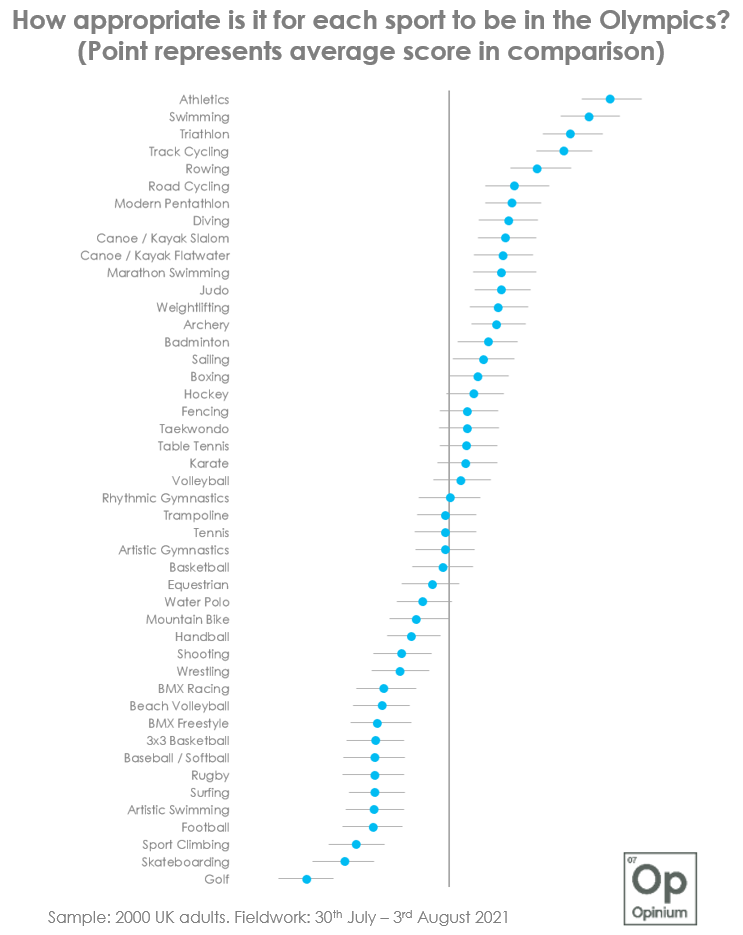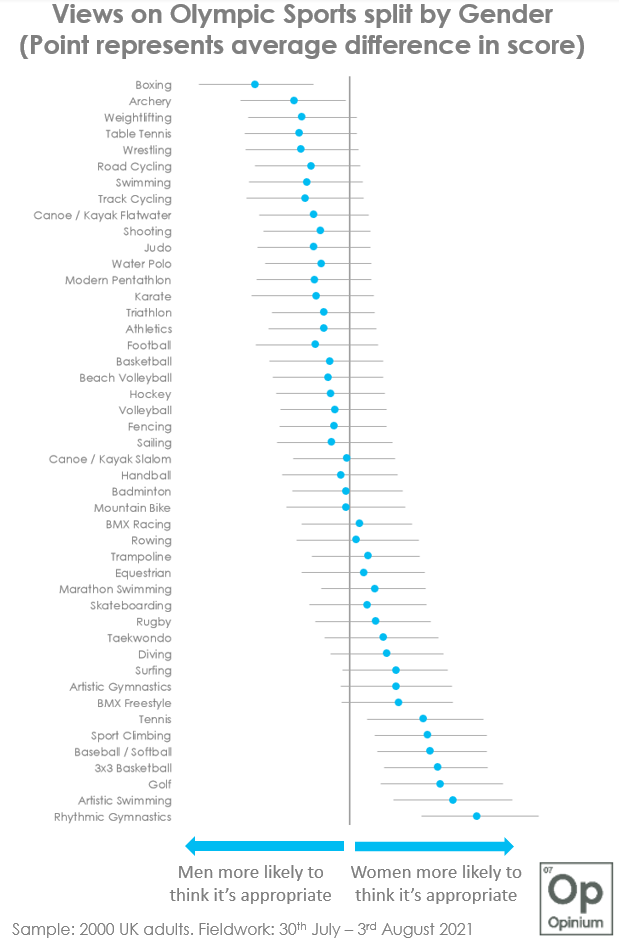Which sports do the public think are appropriate for the Olympics?

Data analysis by Jack Blumenau and Chris Curtis
Among the many controversies surrounding the Olympic Games, few rage as wildly as whether each sport deserves to be included in the first place. While most people would agree that traditional track-and-field events ought to be included, plenty of pundits bemoan the inclusion of niche sports such as skateboarding, surfing, and wrestling.
Rather than limiting this debate to those who have the largest megaphones, we asked the UK public to adjudicate on the appropriateness of each sport in the Olympics. The sheer number of sports now included in the Olympics makes this a difficult task for polling because most people would struggle to provide a complete ranking of the 47 sports included in the games.
Instead, we used “pairwise comparisons”, where respondents make comparisons between pairs of sports included in the Tokyo games. For each comparison, respondents could select whether one sport or the other was more “appropriate” as an Olympic sport (they could also say that the two sports were “About the same”). We asked 2000 respondents to repeat this exercise four times, giving us a total of 8000 comparisons.
Even with this large number of responses, we don’t have very much data for each comparison. With 47 sports in total, there are 2070 possible combinations of sports (excluding instances where one sport is paired with itself).
To overcome this issue, we used a statistical model* to estimate a ranking of Olympic sports. The advantage of using a model here is that it allows us to work out the relative “strength” of a given sport by incorporating information from respondents’ judgements of all other sports to which it is compared. The intuition is straightforward: the more times that sport A “beats” other sports in a comparison, and the stronger the sports that sport A beats, the higher the ranking we assign to sport A.
For instance, if a sport like rugby were to frequently beat “strong” sports like athletics and swimming, then we will assign rugby a relatively high ranking. By contrast, if rugby were to be beaten by relatively “weak” sports (like wrestling, perhaps, or skateboarding), then the ranking estimated by the model for rugby would be lower.
The figure below shows the main results from our model, where points further to the right of the graph indicate the sports that the public consider to be more deserving of their place in the Olympics, and points to the left indicate sports that enjoy less public support.

Athletics, swimming, triathlon, and track cycling come at the top of the list, while golf, skateboarding, sport climbing, and football come at the bottom.
There seems to be two clear patterns in the data. Firstly, older, more established sports are higher up the list, while sports that have been added more recently are further down. The chart below shows the average score for each sport, against the number of years it has continuously had a presence at the Olympics.
Secondly, sports which have large-scale, professional competitions, such as football, tend to come further down the list. Most notably, golf comes in 47th place. The public therefore seems to be relatively unconvinced that golf constitutes an Olympic sport. This may be related to the ongoing saga about which of the world’s top players (in the men’s game at least) are willing to participate in Olympic competition.
Finally, we can also investigate how judgements of Olympic sports differ between male and female respondents. The figure below shows the difference between men and women’s evaluations of each sport.

Men are much more likely to think that boxing is an appropriate Olympic sport and somewhat more likely to think that archery belongs in the Games. By contrast, Women are more likely to think that rhythmic gymnastics and artistic swimming should be included. Women also tend give higher rankings to newer Olympic sports, like sport climbing, baseball/softball and 3x3 basketball than men do.
Some caveats are in order. First, the responses we collected were given in the middle of the Tokyo games, and it is possible that these rankings would have been different if we had run our survey earlier or later. The recent excitement in the UK over medals in newer sports such as BMX freestyle, BMX racing, and skateboarding might yet translate into public support for these sports in future games.
Second, we only included sports that are currently included in the Tokyo games, and so cannot say whether other sports that are not currently included would receive public support. Should netball be an Olympic sport? Or lacrosse? Or ultimate frisbee? We cannot say how the public would view these sports from this analysis, but if you would like to run a survey to find out, then do get in touch.
* For those of you who care, we use a version of a Bradley-Terry model for paired comparison data, adapted to accommodate outcomes with more than two categories.




